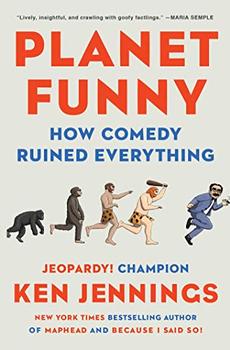Summary | Excerpt | Reviews | Beyond the Book | Readalikes | Genres & Themes | Author Bio

Critics' Opinion:
Readers' Opinion:
First Published:
May 2018, 320 pages
Paperback:
Jul 2019, 320 pages
 Book Reviewed by:
Book Reviewed by:
Norah Piehl
Buy This Book
O, unlaugh it outlaughingly, belaughering laughists!
Laughily, laughily,
Uplaugh, enlaugh, laughlings, laughlings
Laughlets, laughlets.
O, laugh, laughers!
O, laugh out, laughers!
I don't know for sure what was on young Velimir's mind the day he wrote this poem, but his "Incantation by Laughter" turned out to be a pretty accurate look ahead at the twentieth century, with the simple command "laugh" endlessly branching and innovating into complex new forms, just as comedy itself would. The poem came true.
Am I implying that this little verse, scratched out over coffee and cigarettes in a bohemian Saint Petersburg cellar café, actually was some kind of magic futurist spell, invoking a new century of endlessly escalating laughs? You'd better believe I am. Khlebnikov saw himself as a prophet even as a teenager, and believed that he was destined to decipher the "la
ws of time" and predict the future. His essays imagine modern urban planning and even the internet with some accuracy, and he earned great fame for having predicted, in a 1912 pamphlet, the "fall of a state" in 1917—the year of the Russian Revolution. So why not make him a prophet of comedy as well? The secret history of the twentieth century is, after all, largely a history of humor. The old gods were dead, and what was left to us was the laughter of laughering laughers.
Let's be clear: this was not a complete break with the past. People have always made jokes, and most of them went unrecorded. But the culture of which jokes we tell, and when, and why, does change. Comedy's like any art form; it evolves over time. Yesterday's jokes influence today's, and if today's seem funnier, it's largely because we stand on the shoulders of giants.
The funnying-up of modern life has mostly been an organic and imperceptibly slow process, like a glacier inching toward the sea. But sometimes there are watershed moments on a cliff where the ice cracks all at once, and everyone on the cruise ship claps and the landscape in a certain place is changed forever. The glacier just doesn't flow back uphill.
April 9, 1917—seven years after Khlebnikov published his incantation—was such a date. On that day, New York's Society of Independent Artists rejected an entry for its first annual exhibit, a show that was supposed to be open to all artists. Unbeknownst to most of them, the sculpture had been submitted by one of the society's own board members, who later resigned in protest. The artist was Marcel Duchamp, and the work was the first of his "readymade" sculptures of found objects. It was a lavatory urinal, bought from a plumbing supply house, signed with a fanciful "R. Mutt" signature, and laid on its back. Duchamp called it Fountain.
Now, it's certainly possible to name older works of art that viewers found humor in. Paintings were primarily decor for centuries, and funny canvases sold because television hadn't been invented. If you're going to hang something pretty on the wall of your house, why not have a laugh as well? That explains those sixteenth-century Arcimboldo portraits where some Saxon elector or naval hero is constructed entirely of fruit and fish, or those Jan Steen tableaux of merry domestic chaos, where chubby children are chasing each other around a table and the dog has just knocked over a platter of something.
But Duchamp's work was different. It didn't just have a mildly whimsical air to it; it was a joke, a joke you could "get." ("Hey, that's a sideways urinal!") With works like Fountain and L.H.O.O.Q. (the one where he painted a mustache and goatee on the Mona Lisa), Duchamp didn't just found the Dada movement. He started an avalanche of art that was incomplete without the laugh: the optical illusions of the surrealists, the soup cans and comic book panels and giant puffy hamburgers of the pop artists, the great pains taken by the photorealists to document something silly like a chrome car bumper or glass Automat window. The old masters still cast a long enough shadow that these new jokes could be powered by surprise at their mild subversion. That was their whole impact. Ha, someone made that? And someone else hung it up in their gallery?
Excerpted from Planet Funny by Ken Jennings. Copyright © 2018 by Ken Jennings. Excerpted by permission of Scribner. All rights reserved. No part of this excerpt may be reproduced or reprinted without permission in writing from the publisher.





The Flower Sisters
by Michelle Collins Anderson
From the new Fannie Flagg of the Ozarks, a richly-woven story of family, forgiveness, and reinvention.

The House on Biscayne Bay
by Chanel Cleeton
As death stalks a gothic mansion in Miami, the lives of two women intertwine as the past and present collide.

The Funeral Cryer by Wenyan Lu
Debut novelist Wenyan Lu brings us this witty yet profound story about one woman's midlife reawakening in contemporary rural China.
Your guide toexceptional books
BookBrowse seeks out and recommends the best in contemporary fiction and nonfiction—books that not only engage and entertain but also deepen our understanding of ourselves and the world around us.